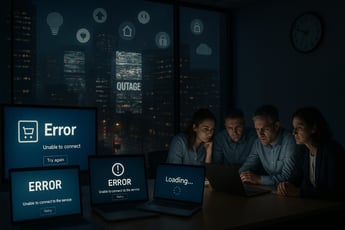In property management and real estate, communication isn’t just important—it’s constant. Phones ring with maintenance requests, texts buzz with showing confirmations, vendors leave urgent voicemails, and clients expect instant responses. That nonstop flow keeps the business moving. But it also makes the industry a perfect target for two scams that thrive on urgency: phishing and its noisy cousins, vishing (voice phishing) and smishing (SMS phishing).
Spot the Difference
Phishing
Fraudulent emails or messages designed to trick you into clicking malicious links or giving away sensitive information like passwords or payment details.
Vishing (voice phishing)
Phone scams where attackers impersonate trusted sources—like banks, vendors, or utility companies—to pressure victims into sharing credentials, payments, or access codes.
Smishing (SMS phishing)
Text messages that look legitimate but contain malicious links or urgent requests, aiming to steal personal or financial data.
How the Hook Works
Vishing and smishing rely on three moving parts:
1. The Setup
Attackers collect phone numbers from data breaches, public records, marketing lists, or even scraped property listings. They prep the scam with caller ID spoofing (to make the number look familiar) or SMS blasting services.
2. The Hook
The first contact is designed to trigger trust or panic:
-
A voicemail from a “utility company” threatening shutoff.
-
A text posing as a rent reminder, delivery update, or showing confirmation.
-
A “vendor” requesting urgent building access.
3. The Play
The scammer pressures the victim to act fast—before they can verify. That could mean clicking a malicious link, handing over login credentials, approving a wire transfer, or sharing a door code.
4. The Payoff
Once inside, criminals either:
-
Steal directly (payments, credentials)
-
Extort (threatening to leak tenant or client data)
-
Sell in bulk (phone lists, logins, property data)
What makes these attacks so effective is that they feel routine. Staff and agents expect urgent calls and texts every day—making the scams blend right in.
Why This Industry Feels the Heat
From leasing offices scrambling to answer tenant calls, to realtors juggling clients and contractors, speed is the expectation. And speed is exactly what scammers exploit. The faster the response, the less time there is to question the source.
Where 3CX makes a difference
Legacy phone systems leave managers and agents blind. They don’t log calls, flag spoofed numbers, or provide visibility into suspicious traffic. With 3CX, every call and message becomes accountable: calls are logged, voicemails are traceable, and caller ID controls help strip away the scammer’s disguise. Pair that with staff training, and suddenly awareness isn’t just theory—it’s practice.
Phishing, vishing, and smishing have grown up alongside the very tools property managers and realtors rely on. They’ve gotten smarter, faster, and harder to spot. But with the right mix of awareness and modern communication systems, you can stay one step ahead—keeping tenants secure, deals on track, and trust exactly where it belongs.
.png?width=824&height=454&name=g9CpWxFF4Hqvx9M0pXv1q%20(1).png)


